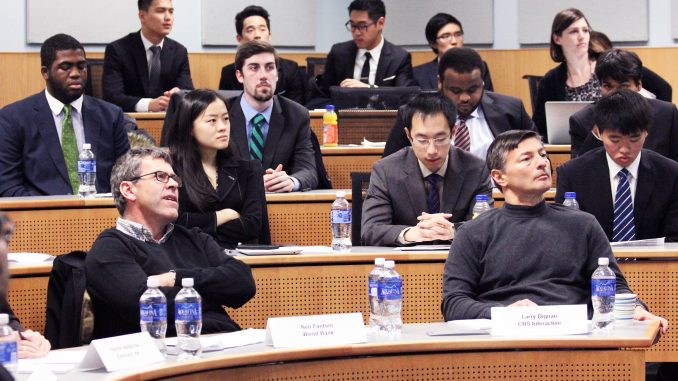
Kaylin Espinosa was disappointed when none of her fellow journalism majors received so much as an honorable mention in Temple’s 2013 Analytics Challenge.
This year she is hoping to change that.
“I found that a little odd,” Espinosa said. “A lot of [journalism] classes are research and we do have to learn some type of design.”
The challenge began last year as an offshoot of a big data conference held by the Fox School’s Institute for Business Systems and Technology.
Now in its second installment, the challenge has picked up sponsorships from NBC Universal, Merck and Lockheed Martin, who, with the help of professors like David Schuff, have posed a series of problems for students to solve.
“You don’t need an enormous amount of data analytics skill to create an interesting entry,” Schuff, a management information systems professor and creator of the challenge, said. “You don’t necessarily need to have an analytics background, you don’t need to know how to use sophisticated software, you just have to have a willingness to go and play with the data.”
One of the major points the challenge is trying to make this year is to include students with a variety of majors and skills.
Last year the challenge had a total of 400 participants and 183 entries came from students in seven different schools and colleges, Schuff said. He hopes there will be an even greater variety this year.
While Schuff said there is a kind of “natural intimidation” of getting started, he said the submission process is actually very flexible.
Students can form groups or submit entries individually, though participants are encouraged to work together.
Of the entries they receive in online submissions, Schuff said 20 students are chosen as finalists, based on the clarity, originality and insight of their design.
“The world today has infinite amounts of information,” James Moustafellos, an MIS professor and collaborator for the challenge said. “The challenge is for somebody, out of all that information, to figure out what’s relevant. The next step is to figure out of all that relevant information, what are the insights we can find in those things.”
The challenges posed by the companies are real life scenarios that the corporations are currently facing. Therefore, they are very invested in the results students find, Schuff said.
Participants can choose from problems like reducing employee insider threats, the impact a change in location has for a corporation and “hotspots” for election spending, all of which, Schuff said, are great opportunities for students to show off their skills.
“The companies that are participating are very interested in what the entries are,” Schuff said. “We’ve had, last year, some of the participants request to see all of the entries we have because if you have 50 or 60 entries on a topic, thats 50 or 60 different perspectives on what your problem is. They’re looking for something that they didn’t see.”
Both Schuff and Moustafellos agreed the challenge is geared toward visual representation of data because it is currently relevant and is something that all students, regardless of their specific career interests, can do.
Fox and Tyler professors also hold workshops over the course of the month to help students get accustomed with design software.
“You’re sort of going through a kind of mini education program if you take advantage of all the resources out there,” Moustafellos said. “It’s an experiential learning-by-doing process.”
The competition is open until Oct. 30.
The final 20 individuals or groups will then present their project before a panel of judges made up of representatives from the sponsor corporations and experts in the field, like Tony Messina, the vice president of IT governance for Campbell Soup Company and Robert Moore, the CEO of RJMetrics.
Though the winners are awarded with cash prizes – $2,500 for one first place winner, $1,500 for two second place winners, $1,000 for two third place winners and $500 for honorable mentions – Moustafellos said there is much more value in the competition outside of winning.
“I think the primary thing is a realization and understanding of the application of these tools,” Moustafellos said. “The event itself, or the prize money, is a one-off. It comes, it goes. The other is something that you take with you forever and that is something I think could be transformative in somebody’s career, and that’s in any discipline.”
Alexa Bricker can be reached at abricke1@temple.edu


Be the first to comment